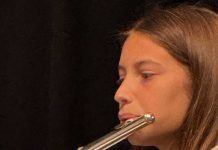Traveling into San Juan Bautista’s past will soon be easier
thanks to four years of effort by students in Anzar High School’s
Crossroads History project.
Hollister – Traveling into San Juan Bautista’s past will soon be easier thanks to four years of effort by students in Anzar High School’s Crossroads History project.
Every semester for the last four years, students have dedicated hours to creating a map of the town cemetery in an attempt to organize and identify the 2,000 gravesites scattered across the cemetery that date back more than 200 years.
“The history of record keeping and mapping (of the cemetery) is piecemeal. There isn’t an authoritative map where everyone can be located,” said Dan Faurot-Daniels, a librarian at Anzar who worked with students on the project.
When the project is finally completed in May, Faurot-Daniels and his students plan to display a large map at the cemetery to allow visitors to find the final resting places of people they are searching for with ease.
“It was definitely an eye-opening experience,” said Anzar senior Lucas Bryde, who has worked on the project during the last year. “You see graves for people who were a few days old to people that were almost 100-years-old. Really, it’s like walking back in time. Even if you’ve never seen these people or met them, you kind of get to know them.”
Students who worked on the project were assigned a section of the cemetery to research and map. They transcribed the information from gravestones in their section and then entered the information and location of each grave into a computerized database. The information is being used to create the visual map. The cemetery map, which is now undergoing final
editing, will likely be complete by the end of May.
“It was fun knowing you were giving the community information that may have been lost or not known at all,” said junior Danielle Mello, who worked on the project last year.
Participants in the project learned and honed a variety of skills, such as measurement, mapping, accuracy and using computer-assisted drawing programs, Faurot-Daniels said.
Although the Crossroads History Project class was cut this year because of budget constraints, student volunteers are dedicated to seeing the project through, even though they no longer get school credit for their work, Faurot-Daniels said.
Initially, working in a graveyard took some time to get used to, but students soon saw the importance of the project to both the community and history.
“It was a little strange at first, because you’re in a cemetery,” Bryde said. “But after a while you realize that this is just another place. And the cemetery needed us to map it. In order for people to pay respects to those who have gone before, they needed a map.”
Bryde also found personal significance through his work on the project, finding the lost grave of the San Juan Bautista man who took in his family when they moved to California about two decades ago.
“I was finally able to pay my respects,” he said. “Moments like this are what this project is built around. A lot of people working on the project were very zealous about that.”
Luke Roney covers education and agriculture for the Free Lance. Reach him at 831-637-5566 ext. 335 or at lr****@***********ws.com









